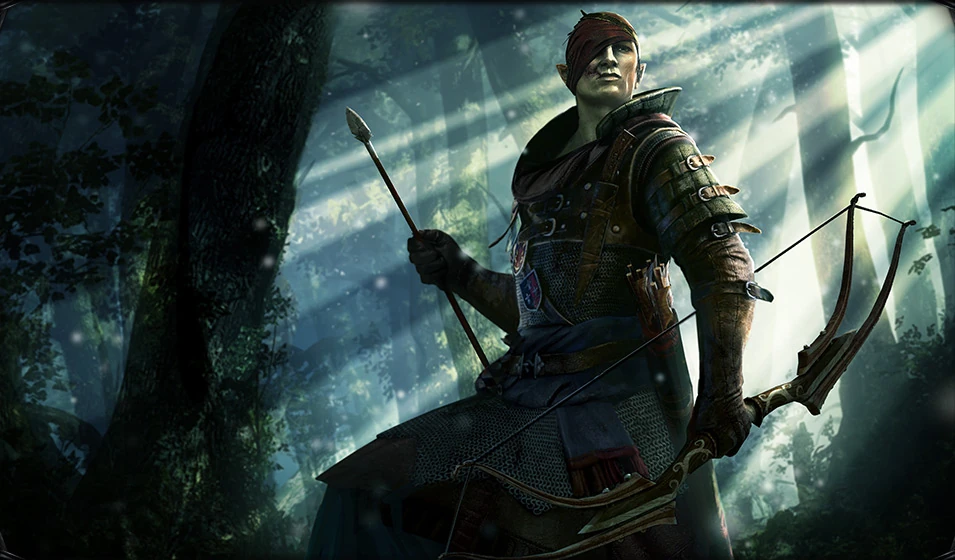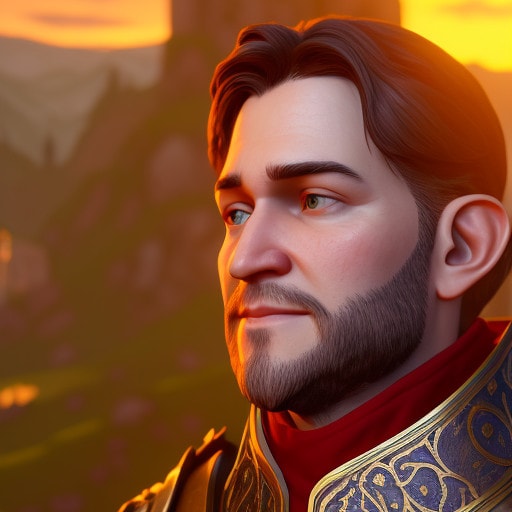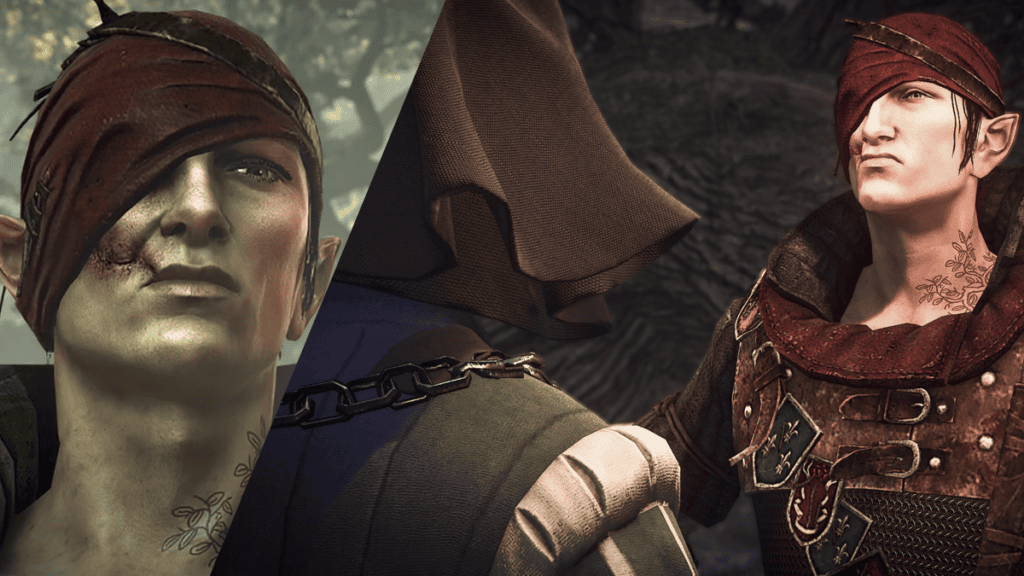In the rich tapestry of characters that populate the Witcher novels and video game adaptations, Iorveth stands out as an anomaly. Despite playing a major role in The Witcher 2: Assassins of Kings, he’s virtually absent from the books and Witcher 3.
Keep reading to learn more about the elven guerilla fighter and his involvement in Witcher 2. You’ll also learn whether you should side with Roche or Iorveth, related decisions, and why Iorveth wasn’t included in Witcher 3.
Table of Contents
Who is Iorveth?
Iorveth is a brash Aen Seidhe elf who features prominently in Witcher 2 and is briefly mentioned in the Witcher books. He’s a commando of the Scoia’tael—a group of guerilla fighters composed mostly of elves and other nonhumans like dwarves and halflings.
The Scoia’tael oppose racism against nonhumans in the Northern Kingdoms by committing the same violence and hatred toward humans. The group appears in both the Witcher books and games, with a particularly major role in Witcher 2: Assassins of Kings.
A skilled archer and tactician, Iorveth and his Scoia’tael aided Niflgaard against the Northerners for the promise of a free state, only to be discarded when the invasion was halted.
As a result, they’re forced to operate from the shadows and are mistrustful of humans, even mutants like Geralt, who face the same level of bigotry as they do.
Iorveth in Witcher 2
The most important decision players make in Witcher 2 is whether to ally themselves with Iorveth or Vernon Roche, a Temerian military commander who opposes the elf. You cannot choose both, and each path leads to a different, parallel storyline with its own quests, locations, and outcomes.
Naturally, siding with Iorveth takes players down the path of advancing the interests of elves and other nonhumans.
Chapter 1
In the game’s first chapter, Iorveth is introduced as a threat to Roche, Geralt, and indeed all humans. There is one notable instance where players can choose to trust Iorveth early on.
Giving Iorveth his Sword or Not
- Giving Iorveth his sword: Geralt allows him to escape an ambush and later align with the Squirrels. This choice gives Loredo, the commandant of Flotsam, an excuse to start a pogrom. This results in a fire and the death of many nonhumans, including a character named Derae that players are introduced to.
- Punching Iorveth in the throat: This results in his capture by Roche’s men. Loredo declares a holiday to celebrate this victory, crediting Geralt for capturing his arch-enemy. Derae survives, but Margot (the proprietor of the brothel in Flotsam) commits suicide to avoid punishment as Iorveth’s informant.
Ultimately, the final choice of the first chapter involves players either siding with Roche or Iorveth, bolstering both their ambitions while working towards Geralt’s personal goals.
The Crossroads
- Siding with Iorveth: Geralt aids Iorveth in attacking a prison barge to stop prisoners from being transported to Drakenborg. After this, the duo sail to Vergen.
- Siding with Roche: Geralt helps Roche and attacks Loredo’s compound, uncovering his treachery and rescuing a she-elf named Moril who’d been missing for a year. Soon after, Geralt and Roche head to a Kaedweni military camp.
Chapter 2
In the second chapter, players who side with Iorveth gain access to a wealth of unique sidequests, with a few main quests being common for both routes.
Iorveth decides to form an alliance with Saskia in the hopes of freeing the Pontar Valley and creating a society where elves, humans, and other nonhumans can live together without the fear of any prejudice.
The chapter culminates in an assault on the town of Vergen, which suffers heavy casualties even if Iorveth arrives with reinforcements to turn the tide. This puts a big dent in his plans, especially with Saskia being poisoned. They both head to Loc Muinne, the Lodge of Sorceresses and Saskia’s fate both critical concerns that need to be addressed.
Chapter 3
Chapter 3 converges the storylines of both Iorveth and Roche’s paths as the game’s story reaches its conclusion.
Iorveth makes an appearance and helps out Geralt, depending on whether he goes to aid Philippa and/or Saskia. Iorveth arrives to aid the witcher in both scenarios, further cementing their friendship.
Should You Choose Roche or Iorveth?
Deciding between Temerian soldier Vernon Roche and Iorveth is the biggest choice to make in The Witcher 2. Both characters offer distinct storylines that lead to completely different experiences, so much so that many players replay the game to try out both options.
One of the first and most obvious differences is that siding with Iorveth makes it easier to find Triss as Geralt, whereas going with Roche prioritizes the search for Letho. Choosing Iorveth is also the only way to lift the spell affecting Saskia at the end of the game.
The two choices also differ in their themes and implications:
- Roche’s path is grounded in the attempt to stabilize the region and support human governance. It focuses on political alliances, royal intrigue, and military strategy while aiding Geralt in his quest to save Triss. This path is more political and dark, and some players consider it more “boring.”
- Iorveth’s path focuses on the plight of nonhumans and the dream of a free state where they can live free. It’s full of fantasy elements like elves, dwarves, and magic. This path is considered more “interesting” by many players and involves more forested areas.
Some players also believe that while both Roche and Iorveth are pretty despicable individuals involved in torture and murder, Iorveth is the “lesser evil.” But one unique strength of the Roche path is that he reappears in Witcher 3 (unlike Iorveth) so taking this path makes more sense from a continuity perspective.
Iorveth in the Witcher Books
Funnily enough, most people who like Iorveth would be surprised to know that he doesn’t play a major role in the Witcher books.
In fact, he’s only briefly mentioned in the Witcher novel Baptism of Fire, as an ancillary character who is seemingly disposed of when the Scoia’tael commanders are being rounded up and executed.
But there’s a silver lining here. Book readers with a keen eye realize that Iorveth is quite similar to another elf from the book who has way more screen time.
This character is Isengrim Faoiltiarna, an experienced Scoia’tael commander. Their physical descriptions are incredibly similar, with the scars on both their faces being a dead giveaway.
Most fans speculate that CD Projekt Red used Isengrim’s character as inspiration for Iorveth.
Why isn’t Iorveth in The Witcher 3?
Fans of Iorveth were disappointed by his absence in Witcher 3. He was initially intended to be a major character in the game, as mentioned by CD Projekt Red in a 2013 Game Informer interview. Unfortunately, that never came to pass because the devs were busy with other things and couldn’t find a good way to make Iorveth fit into Witcher 3.
He’s only briefly referenced by Scoia’tael warriors in a camp outside Novigrad, confirming his existence within the game’s world but not providing any other details. Marcin Momot, the Global Community Lead for CD Projekt Red, later confirmed that Iorveth is alive and well.
Iorveth and the Removed Plague Questline
During development, Iorveth was central to a significant subplot in The Witcher 3 revolving around the Catriona plague outbreak.
He would’ve been seen in Velen, seeking a cure for the plague. Interestingly enough, his endeavors would lead to Iorveth forming a begrudging alliance with his nemesis from Witcher 2, Vernon Roche.
Ves and Thaler would also aid their efforts to secure a cure from a rogue Nilfgaardian scientist. Unfortunately, this sprawling quest line was ultimately cut late in development due to its poor integration with the main game and high resource demands.
However, parts of the plague quest chain were modified and later used for the Hearts of Stone expansion.
Iorveth’s Significance

There are many reasons to like Iorveth. First and foremost, he’s a classical example of a well-written, complex CDPR character with both good and bad traits. Much like Letho, this makes him more relatable, believable, and interesting. We also like him because he’s not your stereotypical fantasy elf, both in terms of looks and personality.
At the same time, Iorveth’s struggle to fight for what he believes in—the freedom of nonhumans—resonates with many players, despite the atrocities he commits.
That’s why like many fans, we were disappointed with his absence in Witcher 3, especially when Roche was included. It would’ve given fans of the series much-needed closure surrounding the character.

Gleb has been playing PC games since the late 1990s and has always enjoyed RPGs the most (Dragon Age, Mass Effect, Elder Scrolls, WoW, Dark Souls, etc.). He had tons of fun playing Witcher 3, so he made this website for discussion, guides, and other info related to the Witcher game, books, and cinematic universe. He travels the world as a digital nomad and spends his time working on website projects, practicing kickboxing, and telling people how awesome intermittent fasting is.
